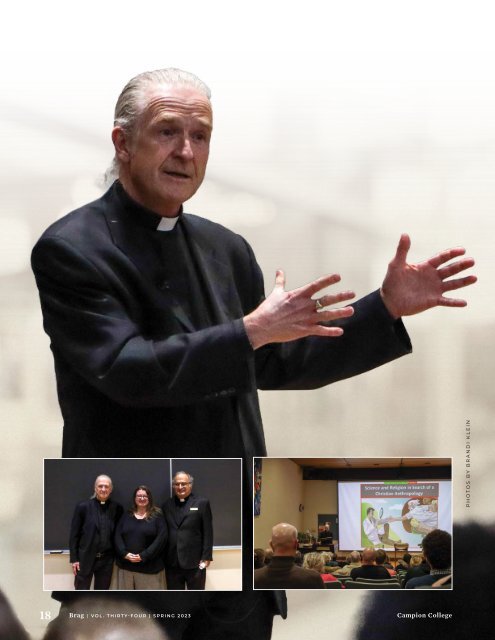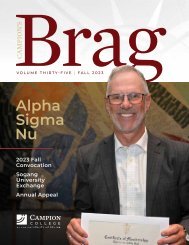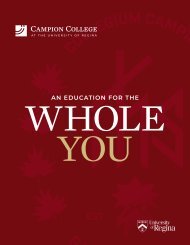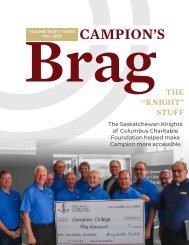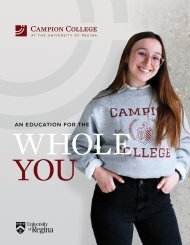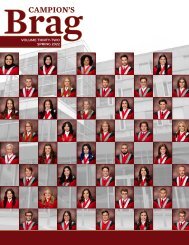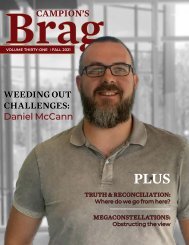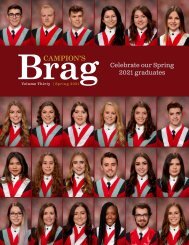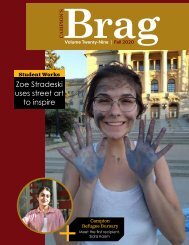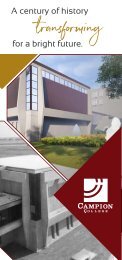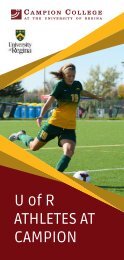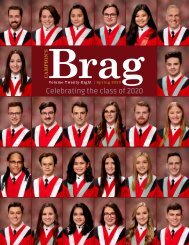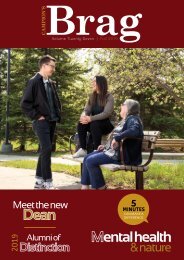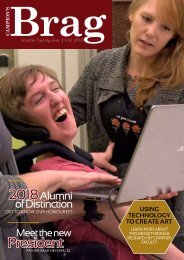Brag - Spring2023
university yqr canada uofr universityofregina jesuiteducated campion regina catholic alumni saskatchewan jesuit
university yqr canada uofr universityofregina jesuiteducated campion regina catholic alumni saskatchewan jesuit
You also want an ePaper? Increase the reach of your titles
YUMPU automatically turns print PDFs into web optimized ePapers that Google loves.
NASH<br />
Memorial Lecture Returns<br />
BY DR. DAWN FLOOD<br />
ASSOCIATE PROFESSOR OF HISTORY AT CAMPION COLLEGE<br />
PHOTOS BY BRANDI KLEIN<br />
The Nash Memorial<br />
Lecture Series was<br />
founded in 1979 to<br />
honour the first<br />
President of Campion<br />
College, Dr. Peter W.<br />
Nash, SJ. This event<br />
welcomes distinguished<br />
scholars from North<br />
America and around<br />
the world to make a<br />
significant contribution<br />
to the academic life<br />
of the university and<br />
community. It was a<br />
pleasure to hold in<br />
person once again,<br />
this premier event at<br />
Campion College.<br />
After a two-year pandemic-related hiatus,<br />
Campion College welcomed around 100<br />
campus and community supporters—with<br />
additional viewers zooming in—to the 41st<br />
Annual Nash Memorial Lecture, delivered by<br />
Dr. Robert J. Allore, SJ. Dr. Allore comes to us<br />
from Vancouver, where he serves as pastor of<br />
St. Mark’s Parish, chaplain to the University<br />
of British Columbia, and Adjunct Professor<br />
of Theology at St. Mark’s College at UBC.<br />
Dr. Allore’s research background as a scientist<br />
investigating the genetics of nervous system<br />
development, and his theology training with<br />
the Society of Jesus combined to shape his<br />
enlightening lecture on “Science, Religion, and<br />
the Search for a Christian Anthropology”.<br />
Dr. Allore began the lecture by suggesting<br />
that science and religion are not oppositional<br />
practices. Indeed, he argues that, in a way,<br />
science is a religious activity in that scientists<br />
spend time seeking truth about the natural<br />
world, and that it is a meditative privilege to<br />
be able to contemplate, on a deep level, the<br />
mysteries of the natural world. Spiritual faith<br />
demands reflection, as does science. Rather<br />
than being in competition, these distinct areas<br />
of inquiry should work in dialogue to best<br />
move forward in service of an increasingly<br />
complex world.<br />
Using examples including an in-depth look<br />
at the Human Genome Project, an ongoing<br />
research project launched in 1995 in an<br />
effort to sequence human genomes in order<br />
to better understand the study of human<br />
biology, Dr. Allore highlighted the excitement<br />
of discovery surrounding this research,<br />
which former U.S. President Bill Clinton<br />
described as “learning the language in which<br />
God created life.” Technological advances<br />
allow for near-total sequencing quickly and<br />
easily today, leading to a number of ethical,<br />
legal, and social issues that potentially arise<br />
out of understanding human life at this<br />
fundamental level. Genome-based research<br />
also enables medical researchers in the<br />
development of more specific and effective<br />
diagnostics and therapeutics, which are<br />
currently being employed in cancer research.<br />
Dr. Allore asks, “how do we integrate<br />
this new information personally, and as<br />
communities of faith, especially considering<br />
that such hi-tech research is not readily<br />
available to all nations of the world, and<br />
how best to democratize the benefits of such<br />
research?”<br />
More than just a theoretical dilemma,<br />
Dr. Allore compares such questions about<br />
genome research with ethical concerns<br />
surrounding the COVID-19 pandemic and<br />
vaccines. He praised the gifts of science for<br />
quick vaccine development, and pondered<br />
issues of vaccine justice/access while<br />
wondering how political leaders and health<br />
experts might address ongoing issues of<br />
vaccine hesitancy and the need for education<br />
that acknowledges and respects people’s<br />
questions and faiths. Placing his broader<br />
scientific research into this timely context<br />
truly brought home the point of his lecture<br />
about the need for science and religion to<br />
remain in dialogue to handle the increasing<br />
challenges global society must face as we<br />
move toward a better future.<br />
18 <strong>Brag</strong> | VOL. THIRTY-FOUR | SPRING 2023<br />
Campion College<br />
Campion College <strong>Brag</strong> | VOL. THIRTY-FOUR | SPRING 2023<br />
19


